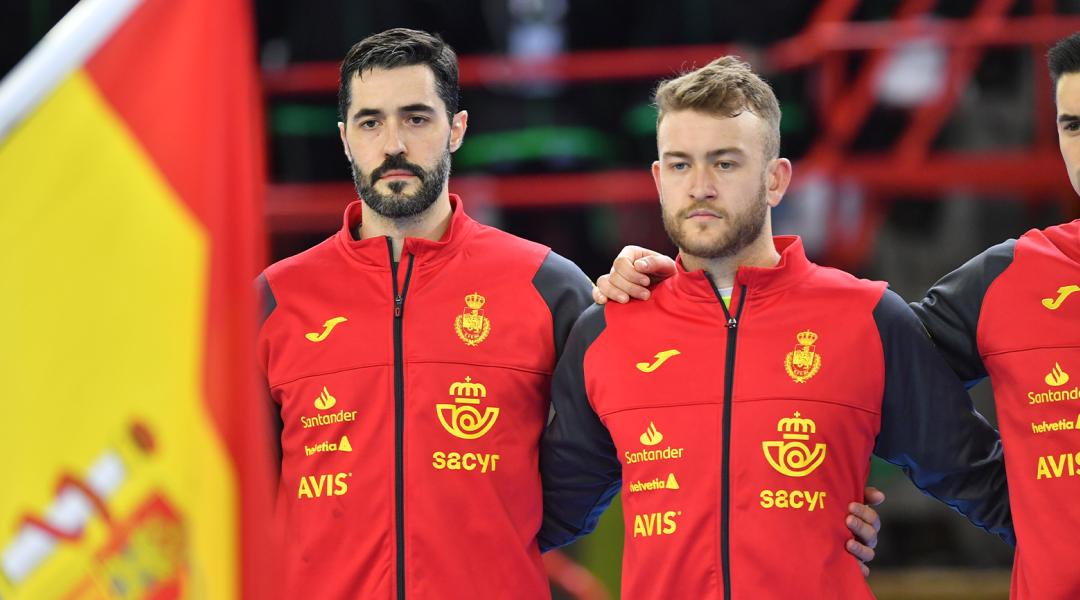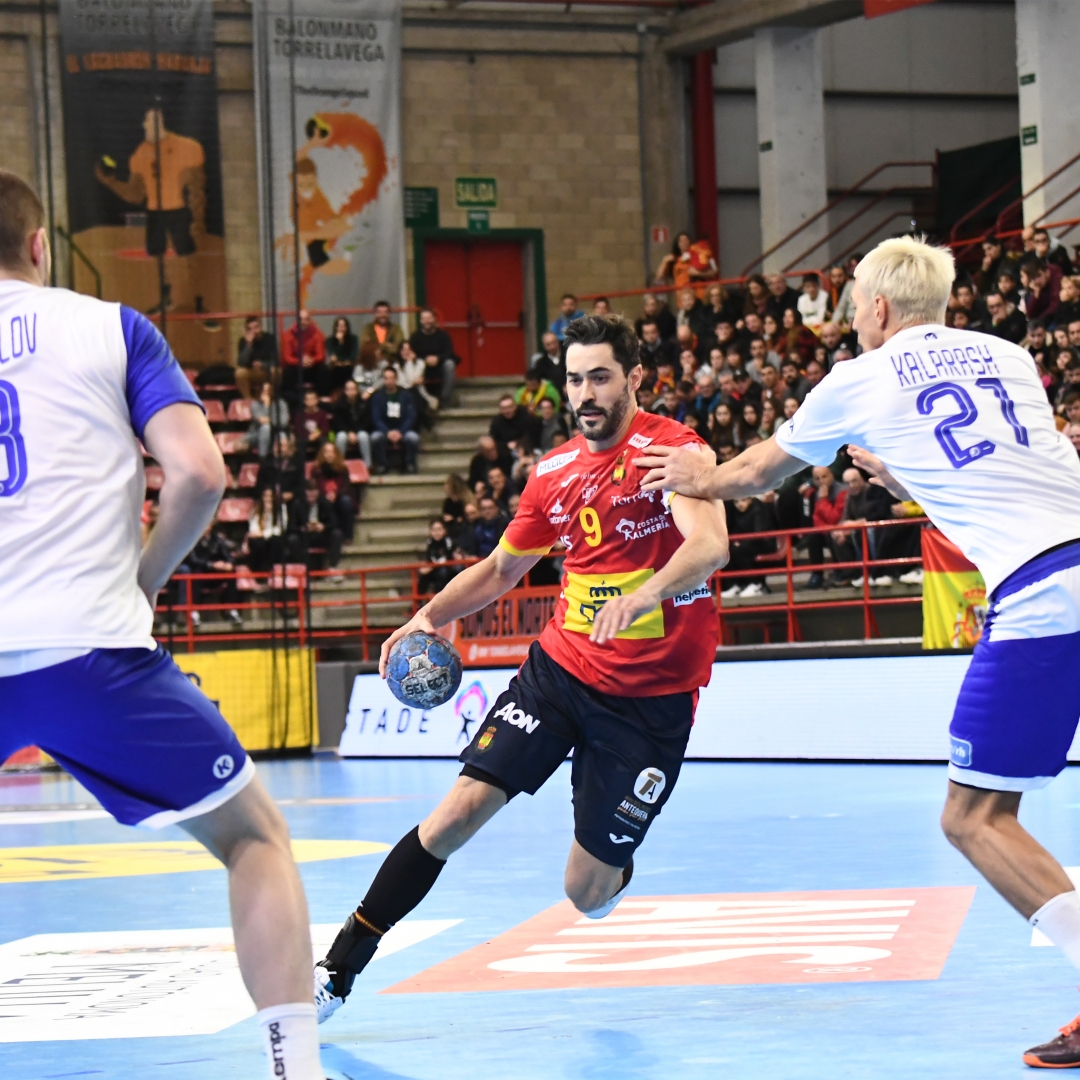Raúl Entrerríos
The 'Hispanos' Leader’s Final European Championship

Having more caps than any of his Hispanos teammates does not mean Raúl Entrerríos is any less eager to play. The captain of the Spanish men’s handball team is starting the European Championship with the same passion as ever: trying to keep the cup in Spain, where it has been since 2016, and at the same time earning a ticket for what, should he succeed, will be his final big tournament: this year’s Olympic Games in Tokyo.
As any fan of the sport will confirm, his surname is linked to handball. And while part of the merit also goes to his brother Alberto, a former player of the national team, Raúl Entrerríos (Gijón, 1981) can boast of being the third Spanish player with the most caps. We stole a few minutes of his time, just days before the Spanish team’s first game at the European Championship, to talk about his years on the highest level, the responsibility that comes with a career like his, and his imminent retirement.
What’s your feeling about the team for this championship? Does having the same player base as the team that won in 2016 give you confidence?
The team is fit and eager to compete and to try to finish among the best again. We’re the reigning champions, which makes this championship even more special. But that doesn’t mean we’re not going to work with the same humility and passion as the other sides.
Unlike our Women’s Handball Team, the Guerreras, you’re starting the championship with your ticket for a pre-Olympic tournament secured, which is somewhat reassuring.
Yes, we secured our pre-Olympic spot after the previous World Cup but winning this European title would give us direct entrance to Tokyo. So, it becomes much more competitive and demanding, as every team wants to have that option.
With their silver medal at the recent World Cup, the Guerreras have set the bar high.
The girls got an excellent result and we intend to continue in that same vein. Hopefully we can do it again and give it continuity—it would be a sign that Spanish handball is living a great moment and that it is where it’s supposed to be.
“I’m as hungry as I was the first day. I’ve always felt that playing with the selection is a privilege"
Is a European championship more complicated than a World Cup because of the quality of European teams?
That’s right. While non-European countries have recently made big steps when it comes to competitiveness and technical quality, handball remains a “European” sport. That why, when you’re playing a European tournament, you can feel it, since none of the matches are simple and you play against teams with very established people, great selections, players from the best leagues. We’ve already seen how hard it is to compete in these big tournaments, like the 2018 World Cup, and this European Championship is not going to be any less.
Last year you announced your withdrawal from the selection for after the Olympic Games. This could be your last big tournament with the Hispanos—how do you deal with it?
Let’s hope it’s not the last one and that there is going to be another big one in the summer! (laughs). But yes, if you look at it that way, I could regard this European Championship as my last chance to play a big tournament with the national team. I’m not thinking about it too much, though. I just want to enjoy the present and focus on the matches ahead. There will be time to look back and take stock later.
You’re the captain, the third player with the most caps in history, and you have more matches under your belt with the national team than any of your teammates. How has Raúl Entrerríos changed over the years?
A lot, of course, although there are similarities to the player I started out as. Most of all, I’m as hungry as I was the first day. I’ve always felt that playing with the selection is a privilege; to represent my country, to have the opportunity to give everything for this jersey and defend what it stands for. When I started, I couldn’t even imagine playing as many games as I have. I’m very proud to stand next to such legendary figures of Spanish handball today. It’s also what motivates me to keep working and to contribute to the team as much as I can, as I always have.
Do you feel a greater responsibility now that you’re the one who’s giving advice to the younger players?
Being a veteran and a captain carries a responsibility that goes beyond simply playing. I think the best way to exercise leadership or captaincy is by example, so I try to convey it from within, showing the path that the great captains I’ve had have shown me. Basically, I try to transfer the spirit and way of working that we have in the national team, which is what’s led us to achieve so many successes over the years.
What are your mantras on the field?
Collective play and companionship.
How do you relax during such long tournaments?
It’s very hard to disconnect during competitions like these because the days are usually very intense: it’s a lot of matches in a relatively short period of time, and with few days to rest. The exhaustion is considerable, both physically and mentally, which is why your best options to escape are by reading, listening to music, or talking to your family so as not to lose touch with the real world. In my case I’ve also been studying—I’ve just finished my studies and have started a master's degree. I must take advantage of days like these, because with children at home it’s difficult to concentrate. (laughs)

Of the current members of the Spanish national team, Raúl Entrerríos is now the one with the most caps. © RFEB
Your brother Alberto is a Spanish handball eminence as well. Do you think it’s a genetic thing, as happens with Dujshebaevs?
I don’t know if it’s genetic, but our family’s clearly good at this sport. The education our parents have given us has been fundamental, since we were brought up on the culture of effort and of earning respect through work. We’ve always seen being members of a team as something special, assimilating it with discipline and giving the most of ourselves.
Not all your teammates have been lucky enough to build their entire career in Spain.
The main problem, and not just in handball, has been the financial crisis. Many have had to go abroad because there are teams that compete with many more resources or financial facilities. That’s why it’s hard right now to keep Spanish talent in our league. However, I think we’re on the right track, as we’re trying to become a much more professional league, especially when it comes to marketing. Building a good competition is essential because our national handball is still a good sport, attractive, with high level players. I hope the time comes when all Spanish players will be able to stay in our league.
What do you see yourself doing in the next couple of years?
I’ll stay involved with handball directly, which we’re already working on. When I renewed with Barça, the intention was to remain with the club once I retired. I’ve studied to become a trainer and will continue to be connected to this sport, working and learning on the other side of the court.

